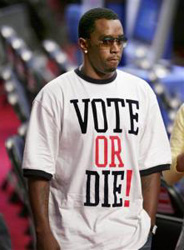
Guest Blogged by Mewa Singh
Partially due to the rave reviews found at Sepia Mutiny, I flew out to Michigan this weekend to attend the annual SAAN (South Asian Action Network) Conference on the Ann Arbor campus. I had a number of different motives, not the least of which, was to make connections with other South Asian activists and learn something that may be of use to a certain conference in Fresno that I have helped with in the past.
 The conference was great. It was on-time, professional, the Michigan students were kind and courteous, and the speakers were top-notch. I had the pleasure to engage with South Asian academic/activists such as Vijay Prashad, Sunaini Maira, and Aasif Mandvi, among others.
The conference was great. It was on-time, professional, the Michigan students were kind and courteous, and the speakers were top-notch. I had the pleasure to engage with South Asian academic/activists such as Vijay Prashad, Sunaini Maira, and Aasif Mandvi, among others.
While I have nothing but admiration for the overall conference and the tireless efforts of its coordinators and staff, there were some observations that I think may be of use for reflection amongst The Langar Hall community.
On a panel discussion, one presenter remarked one of the most important present ways to be an ‘activist’ is to vote. In particular she was canvasing for Obama calling for members of the audience to vote for Obama as ‘he is like all of us.’
Now I don’t really want to get into a conversation about candidates, some of the other bloggers have mentioned their support and active campaigning for him during these elections. I also think there is a marked difference for those that are willing to actively campaign and those that are self-satisfied by the mere act of voting. However, it didn’t sit well with me for someone to so easily hand out the word ‘activist.’ To be an activist takes much more than mere ‘voting.’ Participatory democracy fails if all one does is vote every four years. It takes much more to critically engage with your community and find solutions to existing problems, than merely vote for a person who you believe will do all the work for you. This is a cop out and in someways reckless advice. It breeds complacency, self-indulgence, and a smug sense of self-satisfaction. As Vijay Prashad mentioned earlier in a workshop, “Convenience is not liberation.”
